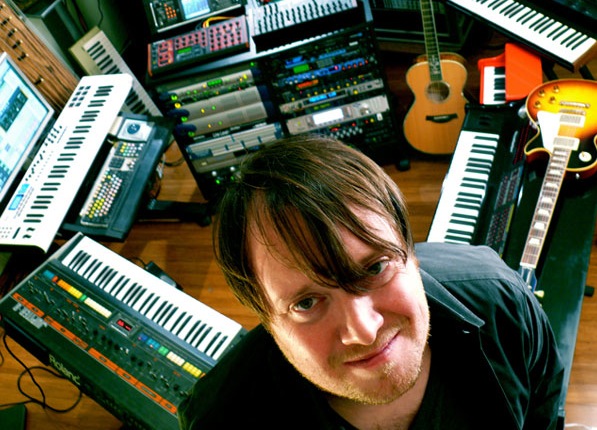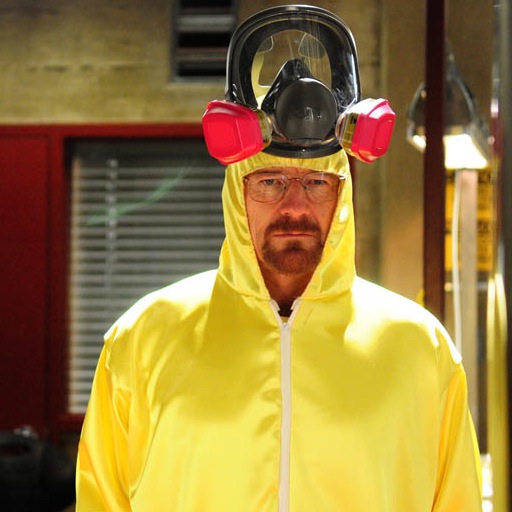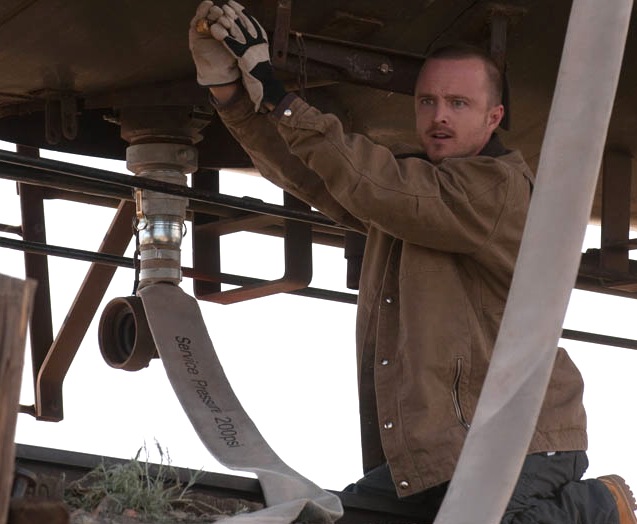 Dave Porter believes his job as composer of Breaking Bad is to highlight the uncomfortableness of the situation, the absurdity of Walter White’s journey and descent into a “criminal overlord” (or, the perception of being one). For his new album Breaking Bad: Original Score From The Television Series, Porter took a look back at nearly six years worth of musical efforts to curate a selection of thrilling tunes from AMC’s hit drama. It’s a highly listenable record thanks to the musician’s innovative use of beats and sounds, but the original score album is also a perfectly timed look back through the show’s history. Walter isn’t the same guy he was when the show first began; Porter’s music reflects that downward spiral with a balance of fanfare and restraint.
Dave Porter believes his job as composer of Breaking Bad is to highlight the uncomfortableness of the situation, the absurdity of Walter White’s journey and descent into a “criminal overlord” (or, the perception of being one). For his new album Breaking Bad: Original Score From The Television Series, Porter took a look back at nearly six years worth of musical efforts to curate a selection of thrilling tunes from AMC’s hit drama. It’s a highly listenable record thanks to the musician’s innovative use of beats and sounds, but the original score album is also a perfectly timed look back through the show’s history. Walter isn’t the same guy he was when the show first began; Porter’s music reflects that downward spiral with a balance of fanfare and restraint.
I caught up with Porter to discuss his work on the album, his close collaboration with series creator Vince Gilligan, and the outside-the-box thinking it takes to find music appropriate for Walt and Jesse’s misadventures. If you think the job’s gotten any easier for Porter, think again — this summer’s Season 5: Part 1 presented plenty of challenges for the composer, from train robberies to quiet moments:
How did you whittle down the all of the music that’s appeared thus far down to a 20-track album?
Dave Porter: Yeah, [the ablum] is four and a half seasons because I included tracks from this summer. It was tough, I must say (and I didn’t realize just how tough it would be). But I enjoyed it — the process was fascinating for me, to go back and listen to these things. I started work on the pilot in 2006. I had to go back and hear things I haven’t heard in many years. And it was difficult. A soundtrack composer’s first goal is to make music that is complementary to the show, supports the show. I am never thinking when I’m writing music for the show, ‘oh, this will be killer on a soundtrack someday.’ As you can imagine, it rarely happens (and especially for television).
To go back and sort through… it was not always the case of ‘what were the greatest pieces I’d done?’ (although some of those pieces are on here). Some of them are there because they make the best stand alone piece. They have interesting substance or they work in conjunction with the other pieces.
I think it’s a miracle and a blessing that your process working on Breaking Bad has resulted in so much diverse and listenable music. Scoring for television is often a rigorous race compared to scoring for film.
Porter: As you point out, scoring music for television has a time constraint. My general workflow for any given episode, when we’re really rolling in the middle of the season, is about a week. To give an example: I would get an episode on a Wednesday night and watch it for the first time. I’d watch twice — once for fun [laughs]. Second time I would go through it very carefully and take notes.
The next day would be our spotting session, which is a meeting with all the relative sound folks: me, our Music Supervisor Thomas Golubic, who picks the licensed music, the Foley artist, Vince Gilligan, the writer of that particular episode, and the picture editor. And we go through the whole show slowly and talk about the sound in every scene. When we talk about music, we talk about where music should be used and where it shouldn’t be used. If we decide we are going to use music, we ask if it should be score or a piece of licensed music. Depending on what that music is trying to accomplish.
 How did you settle on the original musical concept for Breaking Bad? Like many aspects of the show, the scoring is hard to compare to anything else out there.
How did you settle on the original musical concept for Breaking Bad? Like many aspects of the show, the scoring is hard to compare to anything else out there.
Porter: I came about it through my own thought process when I first saw the pilot and through talking to Vince on what he wanted to accomplish in the series. This was all very early on. In general, my conversations with Vince are never about, ‘should we use cellos or harps?’ It’s really, and because he has musical knowledge, but to his credit he leaves those choices to me. We talk about what the music should try to accomplish. When I first watched it, it was so different to me — like a feature film. So I saw it as an opportunity to do something that was different. Everything else about it — the cinematography to the writing to the acting — was pushing boundaries of their crafts. So I hoped to do something different. I’m classically trained, I write music for string orchestras, but I didn’t think this show was the avenue for that.
What instruments or techniques do you use to make Breaking Bad‘s soundscape unique?
Porter: There are a couple categories of things. I ruled out traditional Western orchestral instruments for the most part, I use ethnic instruments from around the world, and I use them willy nilly with each other, paying no heed to where they’re from. African drums with Japanese flutes is perfectly fine in the world of Breaking Bad. I use a lot of synthesizers — I have an enormous collection of vintage synthesizers that I’ve been collecting since I was a teenager. I do use a lot of recordings and found sounds that I make myself. Snippets of strange things that I’m banging on, manipulating them in different ways in the studio. Then the final touch on all of those categories is that I do a lot of processing digitally.
Are you performing most of the instruments? It sounds like a majority of your day involves holing up in a room and banging on stuff.
Porter: It is. Occasionally my 18-month-old son participates. When the mood strikes [laughs]. But an enormous amount of it is me. There are a few of the ethnic instruments that I don’t own or play, so I bring professionals in to perform. There is also a lot of guitar in the show, and I play a little, so the simpler parts are me, but if it gets more intricate, I call a professional.
The album highlights a few recognizable moments, including the creepy “Heisenberg Theme.” What is the process for crafting these music cues tied to characters or emotional beats that may return down the road? Do work on them outside of the usual week-long marathon?
Porter: My process of creating music is based in improvisation. I arm myself with the palette of sounds that are appropriate for what I’m trying to do, but then I start noodling around, basically. Throwing stuff up against the wall and seeing what’s interesting and what seems to stick. Eventually, something does and it becomes a building block for things that work with it and then it’s a nice cue. The Heisenberg theme… when I first wrote that cue, I certainly never knew it would become something that would make another appearance. First of all, I don’t know more than anyone else where the story is going to go. But that moment where that piece was first used… Season 3, when Walt is walking across the desert to meet with Gus, dons his black hat — it became a pivotal moment in the show. When those moments recurred afterwards, it made sense to bring them back. And I haven’t used it often — maybe once a season since.
Vince often describes Breaking Bad as the evolution of Mr. Chips into Scarface, and it speaks to the cinematic blood that flows through the show’s veins. Were or are classic movie scores or genre references a part of your musical conversations?
Porter: Absolutely. If you went back and listen to our spotting sessions, you would find that we are referencing movies far more often than we’re referencing television. Not a slight on television, but Vince thinks like a moviemaker and so much of how we approach Breaking Bad are like mini-movies. Vince has an affinity towards Westerns. We talk about how sound and music are used in those films.
Are there specific movies that you gravitated towards?
Porter: Yeah, Once Upon a Time in the West for sure. That classic opening scene in the train station that’s very spare. We talk about Coen Bros. movies, foreign films — all kinds of stuff like that. We’re out to make television, but those creative choices… we don’t see why they can’t be effective.
Are there sounds or cues that you created used on that you haven’t returned to because of how far Walter is down the rabbit hole?
Porter: Absolutely. I’d go so far as to say, other than some motifs like the Heisenberg motif, I’ve never repeated a piece of music in five seasons. Because of how the show changes, it would no longer be appropriate. This is one of the things that I discovered about what I had done over the years as I went back to work on the soundtrack record. You could hear the evolution. One of the things I chose, after talking to Vince about it, is to leave the music on the record sequential. My hope is that when you listen, you’ll feel the journey. How the show and characters have changed.
 What continued to be challenging or unique in scoring the latest string of episodes in Season 5?
What continued to be challenging or unique in scoring the latest string of episodes in Season 5?
Porter: One of the great things about Breaking Bad is that I always get to do unique stuff I haven’t done yet on the show, and that certainly happened this year back-to-back. The train heist [in episode five, Dead Freight] was an enormous action sequence for us. We have action on the show, but it’s not a focal point of the show. So for me to write a 13-minute consecutive action cue, was something I’d never done and it was a challenge. I relished it.
How did you fit a big set piece like the heist into the musical world of Breaking Bad?
Porter: I relied on the palette I’ve always relied on, but the trick to making a 13-minute action cue, to keep it from being repetitive and boring, is to give it peaks and valleys. Build moments of excitement that fall off. And you have to look at the whole piece over 13 minutes and build it towards the big climactic ending. I used every trick in the book, to be honest. Every trick I had in my disposal — a lot of sounds. It’s a great example of how we use music in Breaking Bad. It was born out of the sounds of the scene, with the train noises and ambiance. Then we built it to what our audience may think is the big finale… only to take music out completely and don’t comment at all for the big sucker punch at the end.
The next week I had the complete opposite, with one of the most spare musical moments, exposed musical moments I’ve ever worked on. The cold open to the very next episode [“Buyout”] where they are disassembling the dirt bike (which is the last cue on the soundtrack.)
Terribly haunting.
Porter: Thank you. That was certainly the goal. A rare treat for a composer, to have a scene that long where there is no audio except you. To be that under the microscope… I wanted it to be, unlike the train sequence which was everything I could throw at it, as haunting and sorrowful as I could. Saying as much as possible with as little as possible.
You’ve had the opportunity to score a good portion of meltdowns — the album and show’s “Crawl Space” piece comes to mind. This midseason finale also seems to be building to a crescendo. What was the challenge of wrapping up this particular end cap and segueing us into the grand finale?
Porter: I don’t want to say too much, but in the way that we use music in those kind of moments, the big moments of revelation, cliffhangers, we use music in one of two ways: We go big, or we go home. We either do a “Crawl Space” moment or source cue moments. Larger than life, there to build as much drama as possible. Or we do absolutely nothing and leave it completely to the actors, the story, and the audience. I can promise you this: It will be one or the other.
[Photo Credit: Dave Porter, AMC]
Follow Matt Patches on Twitter @misterpatches
More:
‘Breaking Bad’ Finale Recap: “Gliding Over All”
It Is Impossible for Walter White to Have a Happy Ending
Dean Norris Teases ‘Brutal’ ‘Breaking Bad’ Finale: ‘There’s Going to Be an ‘Oh, S**t’ Moment.’


